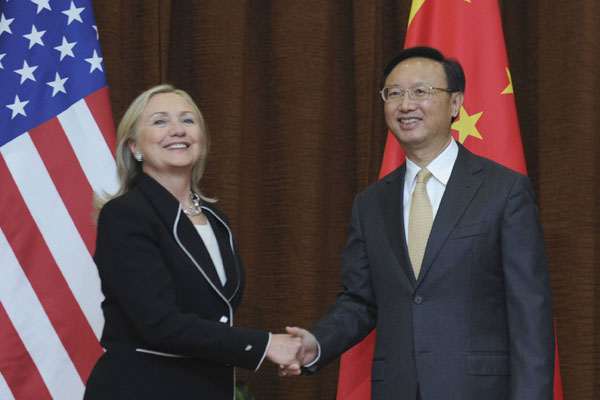 Secretary of State Hillary Clinton is in the midst of a 10-day tour of the Asia-Pacific. Certainly there are many things to be discussed over the week-and-a-half visit, but high on the Secretary’s agenda should be the brewing conflict over the South China Sea and assertion of American interests there, including freedom of navigation, the security of our allies, and peace and security in the broader Pacific region.
Secretary of State Hillary Clinton is in the midst of a 10-day tour of the Asia-Pacific. Certainly there are many things to be discussed over the week-and-a-half visit, but high on the Secretary’s agenda should be the brewing conflict over the South China Sea and assertion of American interests there, including freedom of navigation, the security of our allies, and peace and security in the broader Pacific region.
At times, as in July 2010 in Hanoi and November 2011 in Manila, Clinton has been quite tough on these issues. In Hanoi, over the objections of the Chinese, she declared American interests in the South China Sea and offered to facilitate multilateral solutions. In Manila, she put the U.S. squarely in the Philippines’ corner. By contrast, however, during her visit to Cambodia this July, she was much more conciliatory.
This is no time relent on calling out the Chinese for their extraordinary, extralegal claims in the South China Sea and the aggressiveness with which they are pursuing them. Our best friends in ASEAN, those in desperate need of American support (such as the Philippines), appreciate the U.S. keeping ASEAN’s feet to the fire.
Besides, if ASEAN is allowed to sell the Philippines short, one can be certain that American interest in freedom of navigation is not far behind. This dynamic may make for some discomfort when the Secretary is in Indonesia and Brunei. But it is absolutely essential that the U.S. remain consistently firm.
This brings us to the Secretary’s stop in Beijing. There is no reason that Secretary Clinton’s message regarding the South China Sea should be any different there than in Southeast Asia. In fact, in private, the Secretary can be especially clear. The truth is that the Chinese cannot reconcile claims of sovereignty over the entire expanse of the South China Sea with freedom of the high seas for the ships operating there. The incidents at sea involving the U.S. are not the problem; they are symptoms of the problem, as are China’s conflicts with Vietnam and the Philippines.
As regards the Philippines in particular, the Chinese should be made to understand that the U.S.–Philippines Mutual Defense Treaty is expressly applicable to hostilities at sea between the PRC and the Philippines—and perhaps in other circumstances short of full assault on the Philippine islands proper.
The Administration deserves high marks for its engagement of the region—particularly in Southeast Asia, where it has set a new standard. The region will expect the same of the next Administration. We simply cannot allow the Chinese to have the run of regional institutions by virtue of our perceived indifference.
But the Obama Administration has often missed the mark on the substance of its engagement, whether it’s ambivalence in the debate over defense spending or its lack of high-level commitment to free trade. And when it comes to the South China Sea, it has demonstrated a tendency to ease off the Chinese at precisely the moment it should be pressing American advantages.
Secretary Clinton’s visit to the Pacific over the next 10 days is a perfect opportunity to break this cycle.


























